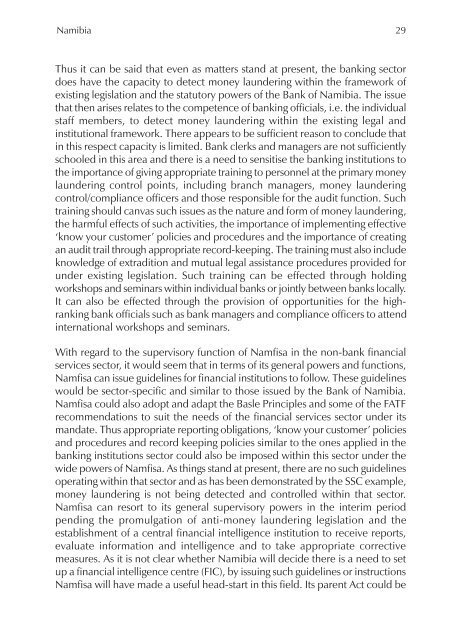Monograph 108 complete download - Institute for Security Studies
Monograph 108 complete download - Institute for Security Studies
Monograph 108 complete download - Institute for Security Studies
You also want an ePaper? Increase the reach of your titles
YUMPU automatically turns print PDFs into web optimized ePapers that Google loves.
Namibia<br />
29<br />
Thus it can be said that even as matters stand at present, the banking sector<br />
does have the capacity to detect money laundering within the framework of<br />
existing legislation and the statutory powers of the Bank of Namibia. The issue<br />
that then arises relates to the competence of banking officials, i.e. the individual<br />
staff members, to detect money laundering within the existing legal and<br />
institutional framework. There appears to be sufficient reason to conclude that<br />
in this respect capacity is limited. Bank clerks and managers are not sufficiently<br />
schooled in this area and there is a need to sensitise the banking institutions to<br />
the importance of giving appropriate training to personnel at the primary money<br />
laundering control points, including branch managers, money laundering<br />
control/compliance officers and those responsible <strong>for</strong> the audit function. Such<br />
training should canvas such issues as the nature and <strong>for</strong>m of money laundering,<br />
the harmful effects of such activities, the importance of implementing effective<br />
‘know your customer’ policies and procedures and the importance of creating<br />
an audit trail through appropriate record-keeping. The training must also include<br />
knowledge of extradition and mutual legal assistance procedures provided <strong>for</strong><br />
under existing legislation. Such training can be effected through holding<br />
workshops and seminars within individual banks or jointly between banks locally.<br />
It can also be effected through the provision of opportunities <strong>for</strong> the highranking<br />
bank officials such as bank managers and compliance officers to attend<br />
international workshops and seminars.<br />
With regard to the supervisory function of Namfisa in the non-bank financial<br />
services sector, it would seem that in terms of its general powers and functions,<br />
Namfisa can issue guidelines <strong>for</strong> financial institutions to follow. These guidelines<br />
would be sector-specific and similar to those issued by the Bank of Namibia.<br />
Namfisa could also adopt and adapt the Basle Principles and some of the FATF<br />
recommendations to suit the needs of the financial services sector under its<br />
mandate. Thus appropriate reporting obligations, ‘know your customer’ policies<br />
and procedures and record keeping policies similar to the ones applied in the<br />
banking institutions sector could also be imposed within this sector under the<br />
wide powers of Namfisa. As things stand at present, there are no such guidelines<br />
operating within that sector and as has been demonstrated by the SSC example,<br />
money laundering is not being detected and controlled within that sector.<br />
Namfisa can resort to its general supervisory powers in the interim period<br />
pending the promulgation of anti-money laundering legislation and the<br />
establishment of a central financial intelligence institution to receive reports,<br />
evaluate in<strong>for</strong>mation and intelligence and to take appropriate corrective<br />
measures. As it is not clear whether Namibia will decide there is a need to set<br />
up a financial intelligence centre (FIC), by issuing such guidelines or instructions<br />
Namfisa will have made a useful head-start in this field. Its parent Act could be
















